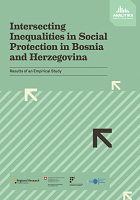Intersecting Inequalities in Social Protection in Bosnia and Herzegovina
Intersecting Inequalities in Social Protection in Bosnia and Herzegovina
Author(s): Tea Hadžiristić, Aida Malkić
Contributor(s): Mirna Jusić (Editor), Edin Hodžić (Editor)
Subject(s): Public Administration, Welfare systems, Ethnic Minorities Studies, Socio-Economic Research, Labour and Social Security Law
Published by: Analitika – Centar za društvena istraživanja
Keywords: BiH; social protection; inequalities; social welfare; minorities; administration;
Summary/Abstract: Recently ranked as the fifth poorest country in Europe by the World Bank, Bosnia and Herzegovina (BiH) faces a number of serious socio-economic challenges. According to World Bank estimates, 17.9% of BiH’s population lived below the critical poverty line in 2011. In 2014 the unemployment rate was 27.5%, among the highest in Europe. The gender gap in employment is substantial, with women making up only 37.1% of those employed in 2014. Youth unemployment (ages 15-24) was the highest in Europe and recorded at a rate of 62.7% in 2014. Educational attainment of the working population is low, with 10.1% having completed higher, 48.7% secondary, and 41.2% primary education or lower in 2014. Compounding this poor socio-economic situation, the social protection system in BiH fails to meet the needs of the most disadvantaged among its citizens. Though the country spends 4% of its GDP on the social protection system – a comparatively high amount – only 17% of that funding goes to the population most in need. Estimates indicate that 72% of social benefits ‘leak’ to persons in far better socioeconomic positions, particularity due to the extraordinarily high level of war veteran benefits. While a large number of people in BiH became unemployed in recent years as a result of deindustrialization, failed privatization measures, and other economic turbulence related to transition to a market economy and postwar reconstruction, social protection has become less effective in responding to the needs of a growing number of social welfare beneficiaries. The current social protection system is marked by a number of deficiencies in both of Bosnia and Herzegovina’s entities (Federation of BiH and Republika Srpska) and Brčko District. One of the key problems in the country is inadequate distribution of the available benefits. Numerous studies suggest that adequate protection is lacking for the most vulnerable users and that the allocation of available resources is disproportionate. Most social work centers are overburdened and have inadequate capacities. This is an especially significant problem given that these institutions collect applications, apply the defined criteria, and decide on the allocation of funds in each specific case. Another problem is a lack of campaigns aimed at informing users on their rights by social work centers and other actors in the field. According to a study based on focus groups with beneficiaries of social assistance, they were not aware of their rights under the current system, which is associated with a lack of information provided by the centers for social work. Overly complicated legislation is an additional component which perpetuates the poor condition of the social protection system in the state. Both entities and the district have different laws in force, whereas competences in each entity are further devolved to local levels (cantons and municipalities in FBiH), leading to wide variations in service provision. In FBiH, the main laws regulating social protection are the Law on the Protection of Civilian War Victims, the Law on Protection of Families with Children, the Family Law, and the Framework Law on Social Protection. The latter establishes a minimum level of social support, leaving it to the cantons to adopt specific cantonal laws, which results in significantly different amounts of social assistance benefits in different cantons). In Republika Srpska, as well as in Brčko District, the main laws in the field are the Law on Social Protection, the Law on the Protection of Children, and the Family Law. For one to enter the social protection system(s) in BiH and exercise the right to social assistance one must be assessed as unable to work or have no other sources of income. The system is means-tested and consists of a series of noncontributory rights available to individuals or families. Available contributions include social assistance for the poor and disability benefits and cover various categories of users such as the poor (those receiving permanent social assistance), persons with non-war related disabilities, and civilian war victims. Supervision is performed by the Ministry of Labor and Social Policy in the FBiH, the Ministry of Health and Social Protection in the RS, and the Department for Health and Other Services in Brčko District, while social work centers perform key operational activities in both entities and Brčko District. In recent years, social protection has been on the government agenda in the context of austerity measures and rationalization of public spending, but a serious discussion on what sort of social welfare model BiH needs has yet to take place. Such a discussion seems more relevant than ever, especially as future reforms are targeted at tightening eligibility rules for social assistance based on need, without an emphasis on the development of important social services or other means of securing decent lives for a number of categories of current and future beneficiaries.
Series: ANALITIKA — Report
- Page Count: 67
- Publication Year: 2016
- Language: English
- Content File-PDF
- Introduction

